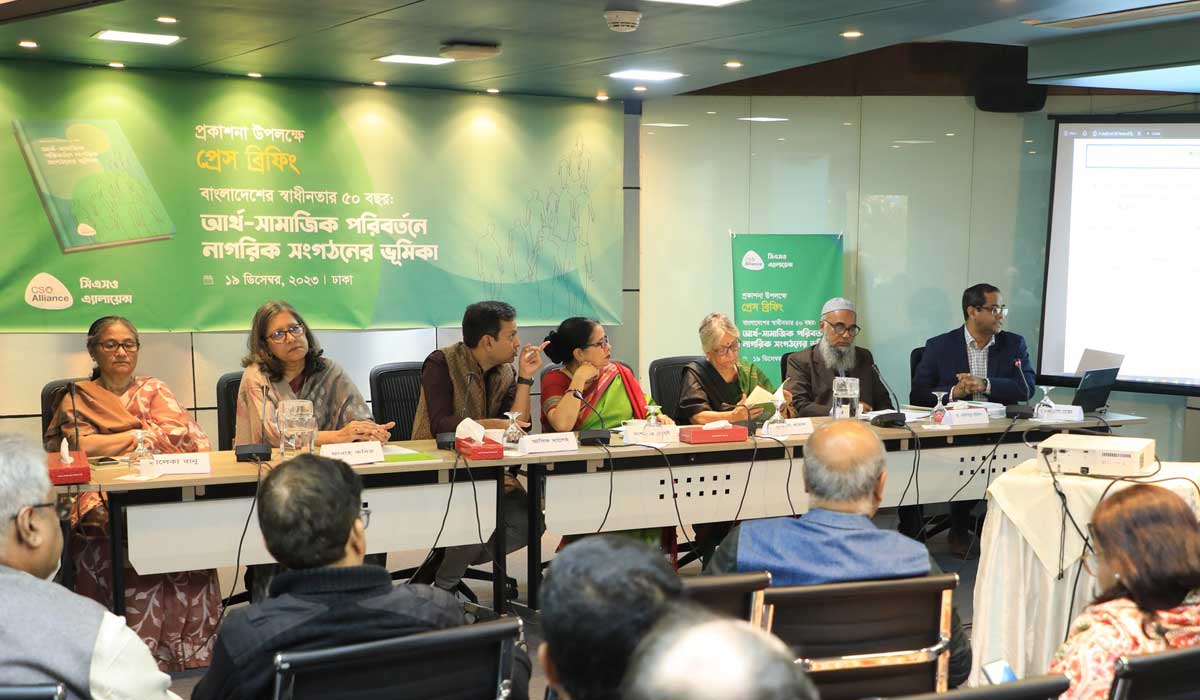Originally posted in The Business Standard on 19 December 2023
CSO Alliance unveils report on legacies of civil society organisations on socio economic change in independent Bangladesh

Over the last 50 years, the state, the private sector, and Bangladesh’s uniquely vibrant civil society organisations have contributed to the country’s impressive socio-economic development. While the roles of the private sector and the state are well-established in the literature, the roles and perspectives of civil society organisations are not adequately documented and recognised.
In the present context, an alliance comprising over 300 non-governmental development organisations, civic platforms, women’s movements, human rights groups, social entrepreneurs, and researchers, collectively known as the “CSO Alliance,” has recently undertaken an initiative to prepare a report titled “50 Years of Bangladesh’s Independence: Legacies of Civil Society Organizations on Socio-Economic Change.”
Significantly, this represents the first instance in the history of Bangladesh where a thorough study has been undertaken, illuminating the crucial role played by civil society organisations in propelling the nation forward.
On December 19, 2023, at the BRAC Center in Mohakhali, the gist of this report was unveiled in a press conference. During this event, Dr. Khandaker Golam Moazzem, the principal researcher of this study and Research Director of CPD presented a condensed summary of the report, emphasising the impactful contributions of civil society organisations to the nation’s progress.
He said, from the broad spectrum of functional and operational areas of CSOs, the main thematic issues covered as part of the volume are agricultural development and food security; micro-financing and entrepreneurship development ; quality education and skills development; health, nutrition and population management; gender and development; environment, climate change and disaster risk reduction; water, sanitation, and hygiene; and inclusive development: mainstreaming the excluded and social mobilisation.
Rasheda K Choudhury, Convenor of CSO Alliance and Executive Director of Campaign for Popular Education (CAMPE) said, in the intricate tapestry of national development, the significance of civil society organisations engaged in the aspirations, endeavours, and advancement of society cannot be overstated. This study delves deeply into the nuanced and dynamic landscape of Bangladesh’s development, shedding light on the pivotal role played by these organisations. Despite facing multifaceted challenges, their unwavering dedication and persistent efforts underscore the notion that realising developmental goals is a shared responsibility, necessitating the active participation of civil society. This documentation would motivate the upcoming generation to contribute to the construction of a thriving Bangladesh, she expressed her optimism.
Human rights advocate Sultana Kamal noted that the Mahila Sangram Parishad began its efforts to safeguard the rights of women and children in 1969, even before the liberation war. Furthermore, women’s organisations have actively contributed to diverse areas such as advocating for the issues like Domestic Violence (Prevention and Protection) Act and The Dowry Prohibition Act etc. While it is practically not possible to list all names individually in this report, Sultana Kamal also acknowledged the contributions of individuals who, of their own accord, worked to protect human rights without seeking monetary compensation or recognition for their labour.
Asif Saleh, the Executive Director of BRAC said, numerous socio-economic initiatives have been implemented in Bangladesh. However, in many instances, these activities have not been meticulously documented, which does not diminish their existence. Gathering and organising this information after several years is a challenging undertaking. The cultural transformation that has transpired in Bangladesh over the last five decades, encompassing aspects such as human development, women’s empowerment, and equal rights, highlights the well-established role of civil society organisations. This awareness is particularly evident among rural populations. Nonetheless, documenting these changes was deemed crucial, and the initiative is commendable from that perspective. Furthermore, he remarked that gaining an understanding of the future role of civic organisations in the next 50 years is highly significant.
Dr. Maleka Banu, the General Secretary of Bangladesh Mahila Parishad, highlighted that the organisation is committed to constructing a nation founded on principles of equality, harmony, and humanity as per the constitution. Despite these efforts, she pointed out that society continues to grapple with significant discrimination and anti-women attitudes.
Farah Kabir, the Country Director of Action Aid Bangladesh, remarked that the civic organisations have actively operated in the evolving scenario after the independence. In addition to chronicling their contributions over the past 50 years, she emphasised the importance of highlighting exemplary figures such as poet Sufia Kamal, Sir Fazle Hasan Abed, Dr. Muhammad Yunus, Dr. Zafrullah Chowdhury, Professor Saleemul Huq, urging the presentation of these role models to the new generation.
Shaheen Anam Executive Director, Manusher Jonno Foundation, emphasised that civil society organisations are dedicated to constructing a nation that is non-discriminatory, democratic, and secular.
In addition, representing the CSO Alliance, Kazi Faisal Bin Seraj, the Country Representative of Asia Foundation; and Dr. Ehsanur Rahman, the Advisor of the National Alliance of Humanitarian Accords in Bangladesh (NAHAB), addressed the audience. Sayeed Ahamed, the Coordinator of CSO Alliance Secretariat and Chief Executive Director of the Institute of Informatics and Development (IID), extended the vote of thanks.


